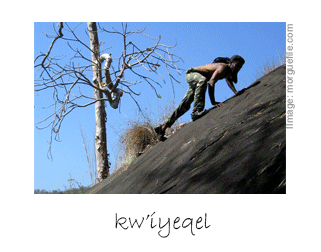Kw’íyeqel means ‘to mountain climb’, or ‘to rock climb’‘.
You can also use it to talk about climbing a hill.
Literally it means ‘climb up (the throat of) a cliff‘.
Pronunciation
Kw’íyeqel sounds like KWEE-uh-kull, except that:
- The kw sound is popped (kw’), by combining it with a catch in the throat (glottal stop).
- The q in –eqel is pronounced not like k, but instead with the back of your tongue touching your uvula.
Audio: Elizabeth Herrling, Elizabeth Phillips
-ing form
Kw’íyeqel, has a special –ing form , to describe an ongoing action, like this: kw’ekw’íyeqel – ‘mountain climbing’, ‘rock climbing’ (audio here).
Elders make this type of –ing form by partly doubling (‘reduplicating’) the first part of the word.
Structure and Related words
The structure of kw’íyeqel is like this:
The root word kw’íy – ‘to climb, to rise up’ also appears in a number of other words, including:
- Skw’iytel – ladder (literally ‘tool for climbing’)
- Kw’ekw’íythet – training (lit. ‘raising oneself up’, the idea being that in spiritual and physical training, you are raising yourself up)
- Kw’íyles, kw’eyles – to become Spring (lit. ‘period when things rise up’)
- Temkw’eyles – Springtime
The ending –eqel literally means ‘in/on the throat‘, and Elders use this ending in many words related to the voice and language. For kw’íyeqel, Elders translate the –eqel ending as meaning as ‘throat of a cliff‘. Some other words with the –eqel ending include:
- Kw’éseqel – burned in the throat (kw’as means ‘get burned’)
- Xwélmexwqel – First Nations language (lit. ‘language/throat of a First Nations person’)
- Sthí:qel – (have a) loud voice (Thi can mean ‘big’, so this is literally ‘(be) big in the throat/in voice’)



No comments yet.